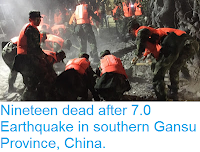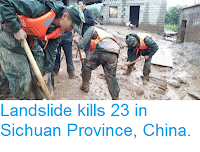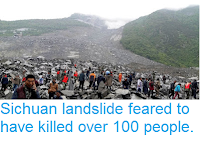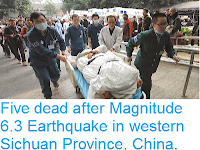The United States Geological Survey
recorded a Magnitude 5.8 Earthquake at a depth of 10 km, in Changning County in Sichaun Province, China, at about 10.55 pm local time
(about 2.55 pm GMT) on Monday 17 June 2019. The quake
is reported to have several buildings to have collapsed in Changning and Qixian counties, as well as some damage in Xuyong County. A total of twelve people have been reported dead so far, eight in Changning and four in Qixian, with 134 reports of injuries, and the number of both dead and injured is expected to rise as search teams work their way through the debris. The area has been hit by a number of large aftershocks.
Rescue workers on a collapsed building in Changning County, Sichuan, following an Earthquake on 17 June 2019. Reuters.
Much of western China and neighbouring areas of Central Asia and the
Himalayas, are prone to Earthquakes caused by the impact of the Indian
Plate into Eurasia from the south. The Indian Plate is moving northwards
at a rate of 5 cm per year, causing it to impact into Eurasia, which is
also moving northward, but only at a rate of 2 cm per year. When two
tectonic plates collide in this way and one or both are oceanic then one
will be subducted beneath the other (if one of the plates is
continental then the other will be subducted), but if both plates are
continental then subduction will not fully occur, but instead the plates
will crumple, leading to folding and uplift (and quite a lot of
Earthquakes). The collision of the Indian and Eurasian plates has lead
to the formation of the Himalayan Mountains, the Tibetan Plateau, and
the mountains of southwest China, Central Asia and the Hindu Kush.
The movement of India into Eurasia over the last 71 million years. USGS.
Witness
accounts of Earthquakes can help geologists to understand these events,
and the structures that cause them. The international non-profit
organisation Earthquake Report is interested in hearing from people who may have felt this event; if you felt this quake then you can report it to Earthquake Report here.
See also...
Follow Sciency Thoughts on Facebook.








